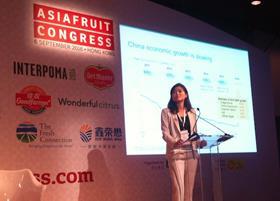
Increasing affluence and a growing awareness of branded products are just two of the reasons why fresh produce suppliers have never had more potential to reach Chinese consumers, according to Youchi Kuo of the Boston Consulting Group.
Delivering the keynote address at today’s Asiafruit Congress, Kuo painted a healthy picture of the overall growth potential for the Chinese market, despite concerns about an economic slowdown in the People’s Republic.
Kuo suggested China was set to enter the era of the rising middle class, with the number of household in the upper middle class bracket (earning above RMB12,000 per month) set to triple from 50m in 2015 to 150m in 2030.
“Consumers are upgrading or graduating to higher classes, meaning they have more spending power,” Kuo explained.
China’s lower tier loom as prime locations to house this emerging income bracket, with Kuo tipping the population of upper middle class and affluent consumers in tier 4/5 cities will grow by 31 per cent between 2015 and 2020. This compares to growth rates of 24 per cent and 27 per cent in tier 1 and tier 2/3 cities respectively over the corresponding time period.
Another growth driver will be the growing recognition and trust being placed in brands by “young generation” Chinese consumers, deemed to be born after 1980.
Kuo says market research conducted by her company suggest this next generation of consumers recognised three times as many brands as the previous generation, and were huge advocates for brands they liked and trusted. “There’s huge potential to plant an image in these consumers minds,” Kuo said.
The emergence of this branding trend is one of the drivers behind China’s growing ecommerce trade, with Kuo suggested online sales will account for 24 per cent of total consumer sales by 2020, up from 15 per cent in 2015.
While ecommerce was showing some extremely encouraging growth, Keo stressed that bot online and offline sales will be important in China’s retail landscape moving forward. It was a sentiment shared by Neil Maffey, chief merchandising officer of Sam’s Club China, who joined Kuo on stage for a panel discussion following the key note address.
“We’ve launched an online service but our in store experience is still really important because we are moving into new products from new supplying countries, meaning consumers often want to try before they buy,” Maffey said. “From this point of view, in-store demonstrations and sampling have become very important to us.”
Over 360 delegates from 40 countries attended today’s congress, which features some 30 presentors.



